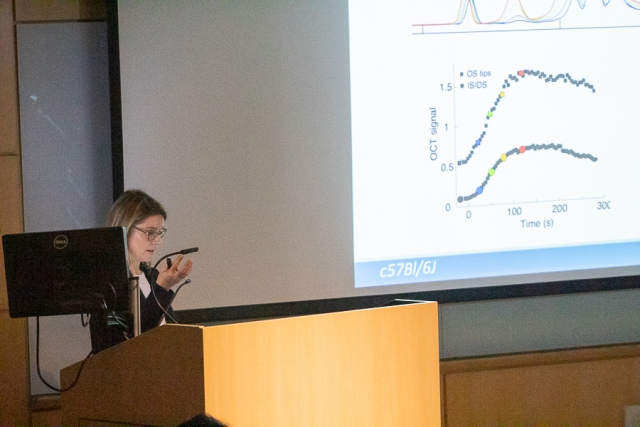
UC Davis Center for Vision Science hosts the 2019 Annual Center for Vision Science Symposium
The Genome and Biomedical Sciences Facility Auditorium was packed with researchers, students and the general public as the Center for Vision Science hosted its Annual Symposium on January 11.
The event featured updates from the center, research talks presented by faculty members, keynote speakers from universities outside of UC Davis and a data blitz, which challenged graduate students and faculty members to concisely capture their research, impacts and future pursuits in minutes.
“The Center for Vision Science started in 1984 with a group of segmented scientists around campus,” said Paul FitzGerald, the director of the UC Davis Center for Vision Science. “Since then, we have had a growth in the number of faculty. We have over 40 faculty members scattered all over campus. This symposium gives us a chance to get together.”
Each year, the symposium rotates between subjects and fields, FitzGerald said.
“We have strong psychology, retina, cornea, optical devices and cell imaging research,” he said. “We want to show different communities embedded in vision sciences and the translational sciences between research and clinical applications.”
Jonathan Horton, a professor of ophthalmology, neurology and physiology at UC San Francisco, presented the John Kelter, MD Distinguished Lecture, discussing how exotropes, individuals who have either one or both eyes turned outward, select an eye for vision.
“Exotropes have a favorite eye,” Horton said.
His research tracked each eye independently, mapping eye movement and behavior.
“Exotropes are faithful to their dominant eye, but it takes more effort to focus on something,” Horton said. “When we provide a challenging target distance from the dominant eye’s perception, they begin to acquire the targets with their other eye instead of their dominant eye. It’s like doubles in tennis—one player dominates and the other player finally gets to play in the game.”
Aaron Beckner, a fourth-year psychology Ph.D. student, presented a segment of his research during the data blitz, which investigates how infants learn through saccades, which are rapid eye movements or eye blinks.
“Imagine you’re trying to sample your environment and you’re an infant,” Beckner said. You don’t have the ability to grab and manipulate items. It becomes really important for you to be able to fixate on individual items and remember something about that individual item in order to guide subsequent items. The logic is at that age, infants have limited motor abilities, the way that they’re learning is through their vision. They have the remarkable task of learning across their lifespan, they have to do memory encoding, vision helps start this process.”
Beckner tracks infant visual learning by exposing infants to the visual features of objects, including different colors and shapes, and measuring how long infants fixate on an object and a changed feature about the object presented using eye tracking and change detection.
“Infants have a natural desire of proclivity, to seek new over old information,” Beckner said. “We try to measure their ability to store information by looking at their novelty object preference for something new.”
When an infant looks at a new object longer than an older object, they have recognized that an object is older through their stored information or encoded memory.
The symposium concluded with vision researchers discussing each other’s findings.
“When we get together and present in front of each other, it leads to collaborations across disciplines,” said Marie Burns, a professor at the UC Davis Department of Cell Biology and Human Anatomy. “It also gives a chance for students and faculty to improve their presentation and communication skills. All of the data blitz speakers gave superb presentations and we got to see their progress in their research projects.”
Written by: Foxy Robinson – science@theaggie.org



